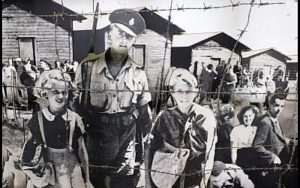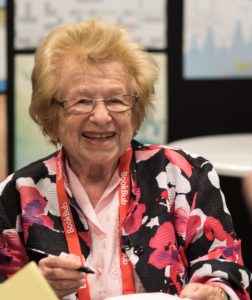
Art Therapy
“One of the basic rules of the universe is that nothing is perfect. Perfection simply doesn’t exist…..Without imperfection, neither you nor I would exist” ― Stephen Hawking




Karola Siegel was born in Frankfurt am Main in 1928, an only child to middle-class Orthodox Jewish parents. She describes her childhood as happy with a lot of friends both from the Jewish school and from the gentile neighbors. Not until the horrible events of Kristallnacht, did she actually experience the antisemitism that washed over Germany. She was 75 when she wrote Musically Speaking, the book I received from a friend for my 80th birthday. By the time she wrote the book she was no longer known as Karola Siegel, but simply as Dr. Ruth – yes, the famous psychosexual therapist who pioneered the field of media therapy. I still remember her programs on TV and radio when people called in with marital and relationship problems, and she boldly advised on sexual matters, becoming a prime-time entertainment for a few decades.
She calls this book, which is actually a memoir, Musically Speaking, because life events and memories are connected in her brain with songs and poems. It is indeed a fairly-well known fact that music and poetry arouse in us feelings and memories which are dormant to the point of even being erased. I was totally amazed how many of her childhood songs like “Little Hans” or “Kommt ein Vogel geflogen” I recognized, and could actually sing the words to.

Kommt ein Vogel geflogen
Setzt sich nieder auf meinen Fuß
Hat ‘nen Zettel im Schnabel
Von der Mutter ein Gruß
Hat ein Zettel im Schnabel
Von der Mutter ein Gruß
Lieber Vogel fliege weiter
Nimm meinen Gruß mit und einen Kuss

Denn ich kann dich nicht begleiten
Weil ich hier bleiben muss
Denn ich kann dich nicht begleiten
Weil ich hier bleiben muss
Und der Vogel flog weiter
Über Berge und Tal
Und die Kinder am Fenster
Sahen traurig ihm nach
Und die Kinder am Fenster
Sahen traurig ihm nach
(A bird comes flying to me, sits on my foot, has a note in its beak, a greeting from my mother. Dear bird fly on, take my greetings with you and a kiss, since I can not join you, I must remain here)
Those were German songs that somehow got seared into my memory without my knowing how and in what circumstances. You see, I, in contrast to Ruth, was only a bit more than 3 when we fled Europe during WWII. Though German was spoken by my grandparents and aunt and uncle, my mother and father conversed mostly in Hungarian, and it was my father who had the good singing voice. Song after song in the book brought back vague recollections of being at my grandparents and being with my uncle, the gentle German gentile to whom I owe my life.
Karola was 10 years old in January 1939 when she, along with about 100 other children (some younger and some a bit older), was taken to Switzerland on a train. This is a part of the Kindertransport that is not usually talked about. Most of the time only the Kindertransport that went to England is discussed. The children were housed in an alpine village, Kinderhouse Wartheim, a home for Swiss Jewish orphans or children who were not able to stay at home. It was located in the picturesque alpine village of Heiden. Though she confessed to having a very poor singing voice, Karola (now Ruth) was the one to lead the singing and became like a mother to all the younger children throughout their stay at the home. By the time the war was over in 1945, most of the children knew that their families no longer existed, and there was nowhere to go back to.
 The Youth Aliyya movement was responsible for bringing youths to Palestine and taking care of them in youth villages and Kibbutzim. My parents were involved in these activities, and indeed my sister left on the last boat before Romania joined the war in June 1940. This was the boat on which my father secured the passage of the group of kids he rescued from Satmar before the border closed. They all became like a family instead of the families they left behind. Throughout the war small groups were able to escape by fishing boat with the help of Zionist activists, and that is how 780 people, including my parents, my brother, and me, managed to escape in May 1944 on the Kazbek, a Turkish boat. Due to strong “convincing power,” it changed course instead of surrendering us to the Germans. It took us many weeks instead of two days to reach Turkey, skirting the Bulgarian fjords, then travel by train through Syria and Lebanon to Palestine. The British incarcerated us in a camp, Atlit, where we spent 6 months, and there I saw my sister for the first time.
The Youth Aliyya movement was responsible for bringing youths to Palestine and taking care of them in youth villages and Kibbutzim. My parents were involved in these activities, and indeed my sister left on the last boat before Romania joined the war in June 1940. This was the boat on which my father secured the passage of the group of kids he rescued from Satmar before the border closed. They all became like a family instead of the families they left behind. Throughout the war small groups were able to escape by fishing boat with the help of Zionist activists, and that is how 780 people, including my parents, my brother, and me, managed to escape in May 1944 on the Kazbek, a Turkish boat. Due to strong “convincing power,” it changed course instead of surrendering us to the Germans. It took us many weeks instead of two days to reach Turkey, skirting the Bulgarian fjords, then travel by train through Syria and Lebanon to Palestine. The British incarcerated us in a camp, Atlit, where we spent 6 months, and there I saw my sister for the first time.
 This is the same camp in which Ruth and most of the youth from the Kinderhouse were incarcerated on their arrival in Haifa in October 1945, after 6 days of traveling on a boat from France. The songs that accompanied their journey were Hebrew songs, no longer German ones. They were released after a few days, and were integrated into a Kibbutz near lake Kinneret. Ruth found a distant cousin of her mother’s in Jerusalem, who helped her fulfill her dream to study and become a kindergarten teacher. Like many young people of her time, she joined the Palmach (the elite fighting force of the pre-state underground army), and fought in Jerusalem during the siege in 1948. On her 20th birthday, she was seriously wounded in action by a shell that exploded during a mortar attack on Jerusalem during the Israel War of Independence, and almost lost both of her feet. She carried some shrapnel in her leg even after the war. This did not stop her from dancing at her wedding, and then moving with her husband to France, where she studied at the Sorbonne, and then to the US, were she worked as a maid to be able to complete her studies and become the celebrity we now know as Dr. Ruth K. Westheimer. She is still actively teaching and writing, at 93.
This is the same camp in which Ruth and most of the youth from the Kinderhouse were incarcerated on their arrival in Haifa in October 1945, after 6 days of traveling on a boat from France. The songs that accompanied their journey were Hebrew songs, no longer German ones. They were released after a few days, and were integrated into a Kibbutz near lake Kinneret. Ruth found a distant cousin of her mother’s in Jerusalem, who helped her fulfill her dream to study and become a kindergarten teacher. Like many young people of her time, she joined the Palmach (the elite fighting force of the pre-state underground army), and fought in Jerusalem during the siege in 1948. On her 20th birthday, she was seriously wounded in action by a shell that exploded during a mortar attack on Jerusalem during the Israel War of Independence, and almost lost both of her feet. She carried some shrapnel in her leg even after the war. This did not stop her from dancing at her wedding, and then moving with her husband to France, where she studied at the Sorbonne, and then to the US, were she worked as a maid to be able to complete her studies and become the celebrity we now know as Dr. Ruth K. Westheimer. She is still actively teaching and writing, at 93.

Though I am only 80, I feel that we have in common a passion for transmitting a positive outlook on life, a love of music, and a desire to write. I am eternally grateful for this little book that came my way and brought back my childhood songs, and with them some forgotten memories of being surrounded by love and light in dark times. I sang the melodies of lullabies that put me peacefully to sleep as a child to my children and grandchildren. Even though they did not understand the words, the music speaks its own language – a language of peace and love and safety. Perhaps they will remember too, and the calm will replace the tensions of the current darkness.

